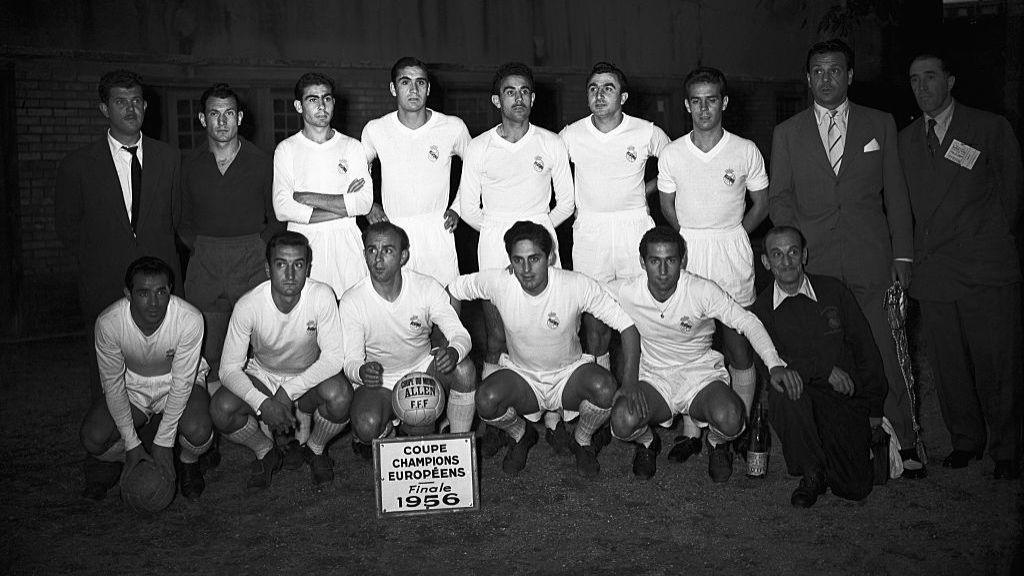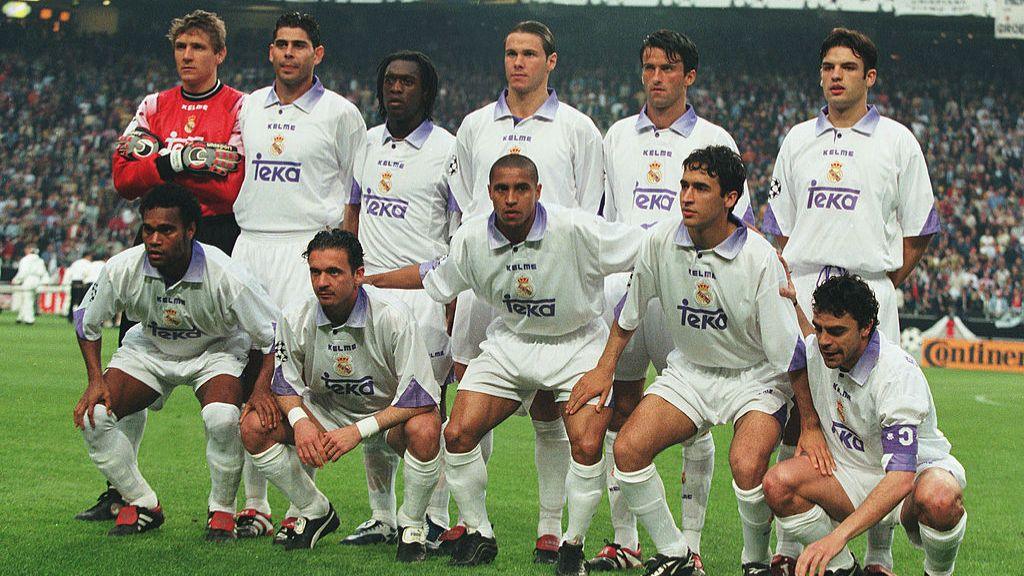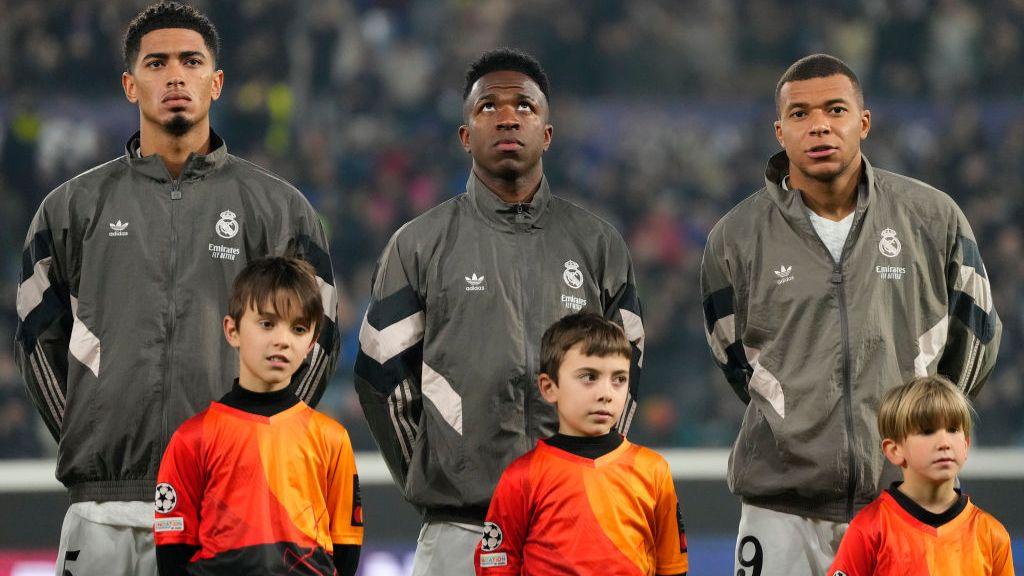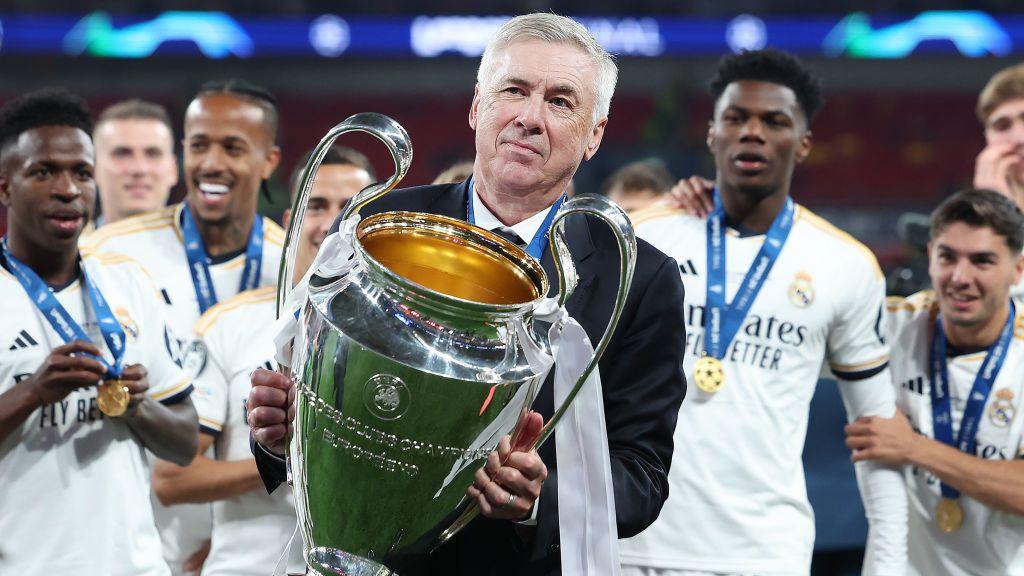Players 'have to win' at Madrid - Khedira
Watch How to Win the Champions League: Real Madrid on iPlayer from Friday 17 January and on BBC One at 22:40 (GMT) on Tuesday, 21 Jan. And listen to more on the Football Daily podcast on BBC Sounds from 17:00 (GMT) on Saturday 18 January.
- Published
No club is more synonymous with a trophy than Real Madrid and the Champions League.
Since 1955-56, when former Madrid president Santiago Bernabeu helped usher in a new competition for Europe's elite football clubs, the Spanish giants have won it a record 15 times, most recently in 2023-24. The nearest competitors are AC Milan – with seven to their name.
But what does it take to become the dominant force in European football?
Former Germany midfielder Sami Khedira, who was part of the Madrid team that won La Decima - the club's 10th Champions League trophy in 2013-14 - says there is an expectation on players who join the club to deliver the trophy.
"You have to bring something back to the shirt - you have to win," he says, in a new BBC documentary - How to Win the Champions League: Real Madrid.
In recent seasons, the Spaniards have seemed to win some games in the competition through sheer magnetism – for instance, during last season's quarter-final second leg when holders Manchester City pummelled Madrid, but ended up losing 4-3 on penalties.
Paul Clement, who was assistant manager to Carlo Ancelotti when the Italian won the first of his three Champions League trophies with the club in 2013-14, says the fans at the Bernabeu Stadium, "suck the ball into the goal".
The weight of history

Madrid won the European Cup a record five times in a row between its inception in 1955-56 and 1959-60
The idea for a competition between Europe's best clubs was dreamt up in 1955 by a group of journalists from French newspaper, L'Equipe. The then president Madrid, Bernabeu, was one of the main proponents.
Spanish football journalist Phil Kitromilides called him a "visionary president," who, "really saw the future of football as a business".
Between 1955-60, Bernabeu's Madrid, with a squad of 'Galacticos' including Alfredo di Stefano, Francisco 'Paco' Gento, Raymond Kopa and Hungarian Ferenc Puskas, won the first five editions of the European Cup consecutively – a feat that has never been repeated.
1997-98 was catalytic for the modern era

Madrid beat Juventus 1-0 in the 1997-98 Champions League final to usher in a new era of dominance in the competition
After winning the European Cup for a sixth time in 1966, it would be 32 years before Los Blancos tasted success in the competition again.
Journalist Graham Hunter says that Madrid, "absolutely abhorred that failure vacuum".
Under president Lorenzo Sanz and manager Jupp Heynckes, Madrid had built a team squad to compete again, signing stars between 1996-98 including Brazilian left-back Roberto Carlos, Croatian striker Davor Suker, Spanish defender Aitor Karanka and Dutch midfielder Clarence Seedorf.
The Spanish team beat favourites Juventus 1-0 in the 1997-98 final in Amsterdam. Juve had won the competition two years prior and had their own megastars, such as Zinedine Zidane and Alesandro Del Piero.
Former President Calderon says, "we didn't think really that we were going to win that title," adding, "from that moment, we started to recover our pride".
Between 1998-2002, Madrid won the competition twice more, to claim three Champions League trophies in five years.
How Perez created the 'modern Galactico'

Madrid have assembled some of the best young talents in world football, adding French forward Kylian Mbappe last summer on a free transfer
Madrid president Florentino Perez has overseen two periods in the club's history, having served at the helm between 2000-06 before returning in 2009.
During his first stint, he aggressively pursued the signatures of the world's biggest stars, or 'Galacticos'.
In 2000, Portuguese forward Luis Figo became the world's most expensive footballer when he quit Barcelona to join their fierce rivals Madrid for £37m.
The following summer, Los Blancos set a new transfer world record when they signed Zidane from Juventus for £45.8m.
In the summer of 2002, Madrid paid £28.5m to acquire Brazilian World Cup winner Ronaldo from the Italian side and in 2003, David Beckham joined from Manchester United for £24.5m.
However, Madrid only won one Champions League and two La Liga trophies between 2000-06.
Calderon, who succeeded Perez, talks about the flaws in his predecessor's strategy, saying, "work always beats talent when talent doesn't work".
During the 77-year-old's second term, he has focused more on buying young talents.
Brazilian winger Vinicius Jr signed for £38.7m in 2018, aged 18 and has become arguably the team's best player.
In 2023, Madrid paid £88.5m to bring then 20-year-old English midfielder Jude Bellingham to the Bernabeu. In his first season, he was the club's top scorer in the league as they secured the Spanish title and a 15th European Cup.
The Independent's chief football writer Miguel Delaney describes this "modern Galactico," approach by saying, "it's signing young, but it's signing young at a certain level".
Hunter calls Perez "the great puppet master" who orchestrated the success of 2023-24.
Ancelotti the 'perfect figure' with similarities to Zidane

Ancelotti has won three Champions League trophies with Madrid, including La Decima in 2013-14
Ancelotti is currently in his second spell as Madrid manager. He first took over in 2013, at which point the club had been through 10 managers since their previous Champions League final in 2002.
The Italian coach, who had previously won two Champions League titles with AC Milan, brought the trophy back to the Bernabeu in his first season. Since returning to Madrid in the summer of 2021, he has won the Champions League twice more – in 2021-22 and 2023-24.
Delaney describes Ancelotti as "the perfect figure" for Madrid's presidential structure, because he is "someone that understands his position within the hierarchy, but also knows how to manage the personalities in that hierarchy".
Seedorf, who played under the 65-year-old at Milan, reveals his former boss stood out from other coaches because he would "listen to ideas," adding, "it would be an open conversation and that made us responsible for the result on the pitch as well".
In between Ancelotti's two spells at Madrid, Zidane had two stints as manager. In his first, he delivered three Champions League trophies in a row – 2015-16, 2016-17 and 2017-18.
Clement says that Zidane has, "similar traits," to the Italian, calling them both, "humble and quiet".